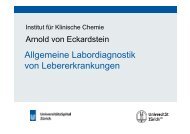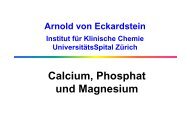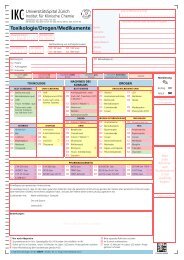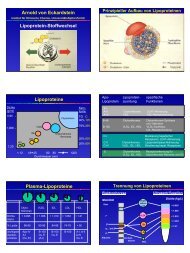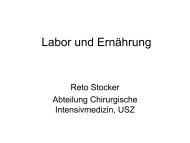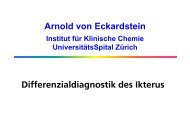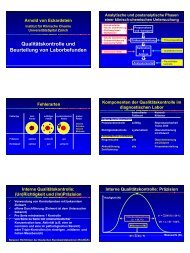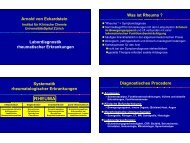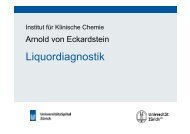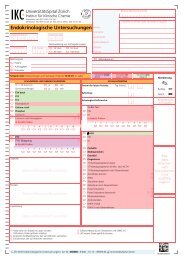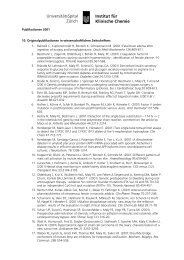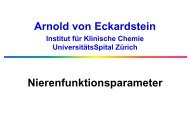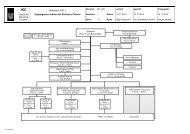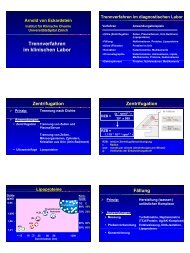2006 - Institut für Klinische Chemie - UniversitätsSpital Zürich
2006 - Institut für Klinische Chemie - UniversitätsSpital Zürich
2006 - Institut für Klinische Chemie - UniversitätsSpital Zürich
Erfolgreiche ePaper selbst erstellen
Machen Sie aus Ihren PDF Publikationen ein blätterbares Flipbook mit unserer einzigartigen Google optimierten e-Paper Software.
Universität <strong>Zürich</strong> > Medizinische Fakultät > <strong>Klinische</strong> <strong>Chemie</strong>, <strong>Institut</strong> <strong>für</strong> > Prof. Dr.<br />
Arnold von Eckardstein<br />
Functional genomics of inborn errors and therapeutic interventions in high density<br />
lipoprotein (HDL) metabolism (HDLomics)<br />
Summary / Zusammenfassung<br />
Despite considerable progress in prevention and therapy, coronary artery disease remains the most<br />
frequent cause of death. High density lipoproteins (HDL) are promising targets to further reduce<br />
morbidity and mortality because low HDL cholesterol plasma concentrations increase<br />
cardiovascular risk and because HDL exert many cardio- and vasoprotective functions. There is<br />
also great need in improving the diagnostic and prognostic value of the biomarker HDL cholesterol<br />
as HDL function is determined by the quality rather than by the quantity of HDL. Therefore, this<br />
HDLomics project will apply functional genomics approaches including genomics, proteomics and<br />
lipidomics as well as new clinical diagnostic tools to study the effects of differential regulation of<br />
HDL metabolism on pathophysiological events relevant for atherosclerosis: 1) Using genome wide<br />
linkage analysis in families with Mendelian inheritance of low HDL cholesterol we will search<br />
new major genes regulating HDL cholesterol. 2) Using high throughput sequencing and allele<br />
specific genotyping technology we will elucidate the impact of mutations in candidate genes for<br />
the variation of HDL cholesterol as well as other lipid traits and the occurrence of cardiovascular<br />
events. 3) Using knock-out and transgenic mouse models we will study the metabolic and vascular<br />
impact of mutated candidate genes on HDL metabolism. 4) We will employ proteomic and<br />
lipidomic tools for the characterisation of HDL and finding specific effects of mutations or<br />
interventions on the structure and function of HDL as well as on lipid metabolism and<br />
atherosclerosis. 5. We will develop and evaluate new therapies including gene therapy protocols<br />
for the correction of inborn errors of HDL metabolism in humans. The ultimate goals of<br />
HDLomics are hence the identification and validation of new targets, which can be used in<br />
differential diagnosis, prognosis, therapy, prevention, and therapy monitoring of low HDL<br />
cholesterol and atherosclerosis. This STREP project is exerted in the course of the 6th framework<br />
programme of the European Commission, involves seven partners from 5 European countries and<br />
is coordinated by the University of Zurich<br />
Weitere Informationen unter http://www.hdlomics.org/<br />
Publications / Publikationen<br />
von Eckardstein A, Hersberger, M, Rohrer, L (2005). Metabolism and biological actions of HDL.<br />
Curr. Opin. Clinical Nutrtion and Metabolic Care. 8: 147-152<br />
von Eckardstein A (<strong>2006</strong>). Differential Diagnosis of Familial High Density Lipoprotein Deficiency<br />
Syndromes. Atherosclerosis 186: 231-239<br />
Keywords / Suchbegriffe<br />
animal models, atherosclerosis, cardiovascular disease, genetics, inborn errors of metabolism, high<br />
density lipoproteins, lipids, lipidomics, prevention, proteomics, functional genomics, systems<br />
biology<br />
Project Leadership and Contacts / Projektleitung und Kontakte<br />
Prof. Arnold von Eckardstein, MD (Project Leader) arnold.voneckardstein@usz.ch<br />
Project 8608<br />
Seite 1<br />
All



